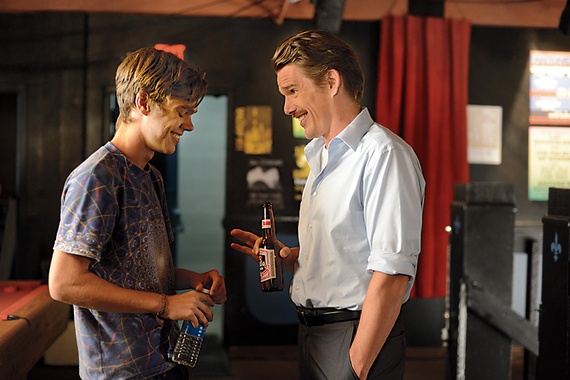REVIEW: 'Boyhood’
If there’s one thing that motion pictures do better than most art forms, it’s the compression of time. As films like 2001: A Space Odyssey and The Tree of Life prove, filmmakers can jump millions of years into the past or future in an instant, and if done correctly, the audience will be with them every step of the way. Very often, this has to be done with complex make-up or special effects to create the illusion.
But the passage of time has never been handled in the way Richard Linklater does in Boyhood. Not only is the result one of the most natural, relatable productions I’ve ever seen, it’s done without any cinematic wizardry. Linklater shot the film over a period of 12 years, one piece at a time, following a young boy and his family as he grows up. Linklater’s special effect is time itself, and it’s a powerful commitment to the art form, as well as a striking cinematic achievement.
What’s satisfying is how Boyhood also works as a logical development of what we’ve seen from the director so far. Linklater’s excellent Before trilogy, which charts a romance between two characters played by Ethan Hawke and Julie Delpy over nearly two decades, demonstrated new ways of handling the concept of time in movies. As Hawke and Delpy walk through European locales, talking like regular people, the films follow them in real time. We’re welcomed into the story, reaching a level of immersion that all the CGI and visual manipulation in the world couldn’t achieve.
By combining episodes from 12 years of a boy’s life, Linklater explores time in a new way. Unlike the Before films, the scenes are structured and paced in a conventional way, but they show something that will feel instantly familiar to viewers, even though they’ve never seen it before on screen. We watch as events we’ve all experienced roll by: moving to new towns, parents getting new jobs, falling in love, bad haircuts, and braces. We watch children transition into teenagers and then into adults. We watch their parents get grey hair and wrinkles. Better yet, it never feels saccharine or self-gratifying.
I’m also struck by the extraordinary opportunity the film presents to its cast. It’s hard to come up with another example of a movie that allows its actors to get to know their characters over such a long period of time, and to work their own lives into the performances. This is one of the ways the film feels so natural – we feel less and less like these are fictional people.
The idea of the film as an opportunity is especially true of the actors who were children when it began filming. Ellar Coltrane plays the film’s main character, Mason, and Lorelei Linklater (the director’s daughter) plays Mason’s sister Samantha. The usual fears about child actors are instantly dispelled – these kids had talent at the moment they were cast, and their work in this film has only allowed them to nurture it. They’re backed up by strong work from Patricia Arquette and Ethan Hawke as their parents, as well as a gallery of supporting players who give the film plenty of texture.
One of the reasons I’ve downplayed the plot in this review is that it doesn’t drive the story in the fashion of so many other releases. All you need to know is that Mason begins the film as a boy whose single mother is always scrambling to make ends meet. Her involvements with men always seem to change the course of Mason’s life, and as he gets older he becomes particularly aware that childhood, and other people’s plans, are holding him back. He looks forward to turning 18, not to distance himself from his family, but just to see what kind of path he can forge for himself.
As our entry point into the film, Mason is an ideal character: he’s easy-going and quiet, and doesn’t let things get to him. While his backstory is wholly different than my own (I grew up in another country, with a stable family) I still saw some of myself in the character, and I believe many viewers will. At some point, most of us have been that observant kid watching events play out around us, trying to understand where we fit, and then wake up one day to realize how those events have changed us.
Perhaps this review has a duty to report that the film’s runtime (2 hours and 40 minutes) might turn people off on a purely numerical basis. But I can’t stress enough how that length flies by – when you have cacophonous blockbusters with similar runtimes that manage to make every minute an ordeal, it’s so pleasant to see a movie that makes such heartwarming use of its extended time before us. And when it happens to be a movie that meditates on something as fleeting, transformative, and yet familiar as the passage of time, you remember every moment. Boyhood gets four stars out of four.
What did you think of Boyhood? Is it one of great achievements in cinema? Or was it too much for you? Join the discussion in the comments section, and if you liked this review, share it with your friends and followers!




